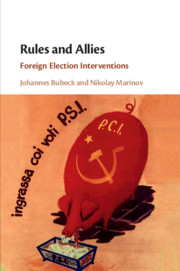Refine search
Actions for selected content:
3 results
7 - The Geopolitics of Islamism
-
- Book:
- Jihad in the City
- Published online:
- 04 May 2021
- Print publication:
- 06 May 2021, pp 366-414
-
- Chapter
- Export citation
7 - When Money Runs Low and Regime Overthrow
-
- Book:
- Rules and Allies
- Published online:
- 15 July 2019
- Print publication:
- 25 July 2019, pp 179-202
-
- Chapter
- Export citation

Rules and Allies
- Foreign Election Interventions
-
- Published online:
- 15 July 2019
- Print publication:
- 25 July 2019
